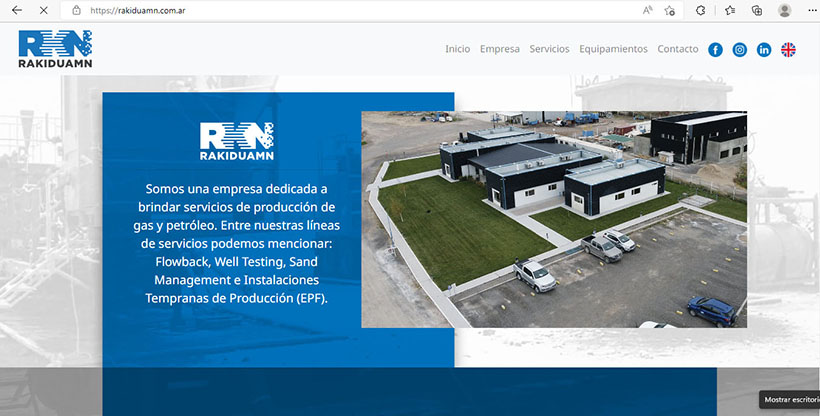An investigation that exposes the double standards of extractivism, the visual plot that underlies it and the incidence of a “service company” created to erase the criminal traces (ecocidal) that are produced against all forms of life that inhabit nature.
Rakizuam or rakiduam is a Mapuche word meaning thought. With this word the oil services company Rakiduamn S.R.L. was incorporated as such in 2012. And although the word is modified (the M and the N are not used together in any of the three Mapudungun graphemes), Mariano Aiassa himself, founder of the company, acknowledged this in an interview given on 26 September 2018 to Diario Río Negro, stating that “it is also a Mapuche word, which means people of the land, and we are from this land”.

Note from the Río Negro newspaper in which Luis Aiassa explains the origin of the company’s name.
The adaptation of the concept and the distortion of the word for their own benefit is not a new attitude, much less an innocent one. It has been practised in this territory for more than 140 years. White men and women (self-recognised) pioneers of this territory, founders and legitimate shareholders of the resources and natural elements of this sacred space, today converted into a large “sacrifice zone”. While on the other side, the locals, dark-skinned youth, trarilonkos and diverse Mapuche communities, must live in overcrowded, negationist and constant diaspora, living in reduced, unproductive spaces, plagued by disease and contaminated water.
The visual scenario is contrasting, as cynical as it is outrageous; as naturalised as it is invisibilised. And the more I investigate, the more contrasted the visual scenario becomes. First: I find in an official bulletin of December 7, 2017, that the initial capital of the company Rakiduamn SRL was $12,000, divided into the six founding parties: the brothers Mariano and Luis Aiassa, their respective wives Carolina García Tourn and Mariana Moll, and the brothers Carlos German Pérez and Sergio Alberto Pérez. Second: in the interview with Diario Río Negro, Mariano Aiassa acknowledges that they had a turnover of 500 million pesos, with a total of 80 employees. Third: when I went to the company’s official website, I could quickly see the name in Mapudungun in contrast to an English flag. Fourth: in the personal Linkedin profiles of each of the founding partners, one can read that Mariano Aiassa worked at Petrobras and Repsol, while Luis Aiassa is a partner in Pascolo (a dairy company). Last but not least, Carolina García Tourn graduated from the National University of Comahue as a Chemical Engineer and was Head of the Environmental Management Department (between 2006 and 2008) of the Municipality of Cipolletti.
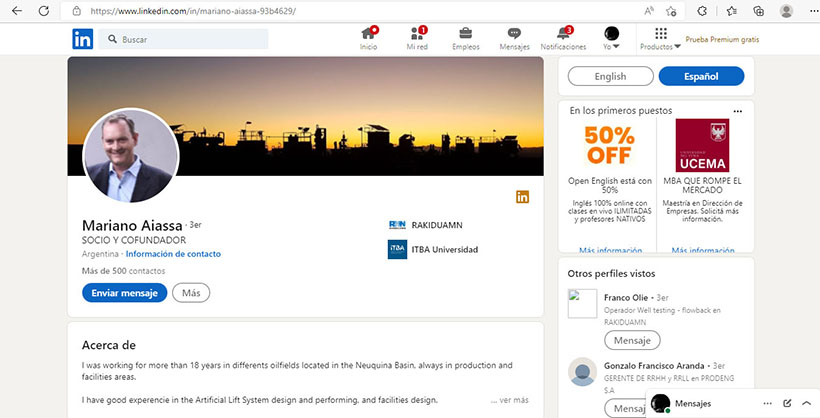
The fact is not minor: the corporate parties have direct links with the contracting companies, but also with the state authorities in charge of legislating and administering possible complaints and/or approvals of projects and operations.
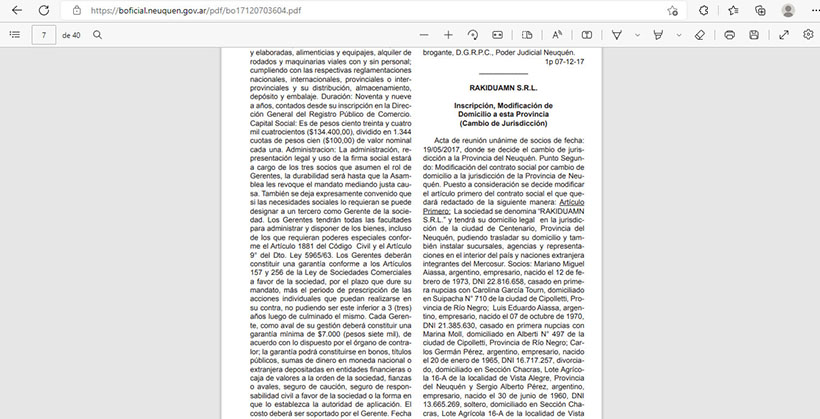
But what does Rakiduamn SRL actually do?
On Rakiduamn’s official website you can read about its specific functions. On the one hand, they mention flow back, stating that “the service aims to clean the well after fracturing, preventing the remaining sand from fracturing produced in the first hours of opening the well from entering the client’s permanent production facilities”. On the other hand, the company Rakiduamn mentions Sand Management explaining that:
“SHALE fields that require large hydraulic fractures for production remain with sand production throughout the life of the wells. To avoid facility failures, it is necessary to use equipment that removes sand at different points in the production chain”.
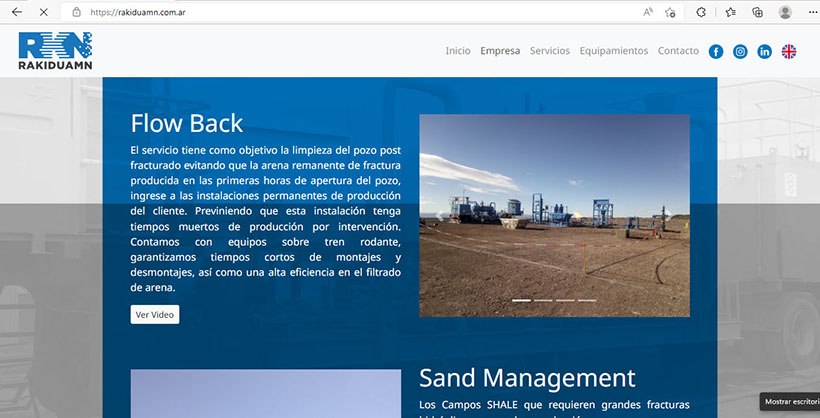
Rakiduamn has practically sold its soul to the devil. This company is in charge of managing, handling and removing the sand (or at least leaving it in “optimal conditions” for possible control) that remains as a residue after hydraulic fracturing. The same sand that is introduced into the bones of the earth’s body is charged with a battery of heavy metals that to this day are forbidden to the public and, therefore, to the general population.
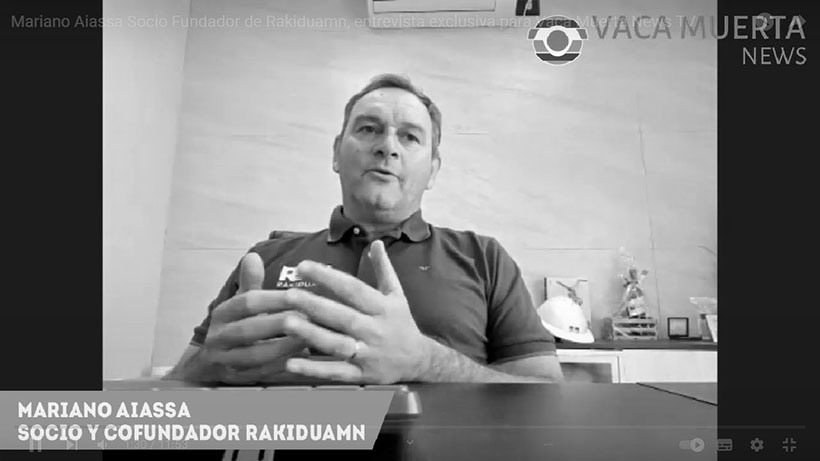
Screenshot of Mariano Aiassa during an interview with Vaca Muerta News.
Can you imagine the facts and background that the company Rakiduamn SRL has seen in these ten years? What have Rakiduamn’s workers had to see, approve and keep silent about? Are the lungs and organisms of these workers contaminated? Is there special equipment capable of protecting the integrity of a person in these cases?
In the early hours of Wednesday 22 June, while different Mapuche communities (rural and urban) were celebrating Wiñoy Xipantv (the new solar cycle), news began to circulate that a 32-year-old man had lost his life at midnight on 21 June at the Río Negro oil field, operated by YPF. Later, during the course of the same day and accompanied by a family photo, the name of the victim became known: Víctor Vázquez. Victor was a Rakiduamn employee who at the time of his death was providing services to YPF. In the photo, Victor can be seen wearing a River t-shirt, holding a child on his shoulders, showing in front of the camera a sincere laugh, charged with good thoughts (kvme rakizuam). “Another dark-skinned, big-laughing young man taking greed and corporate impunity with him,” I thought.
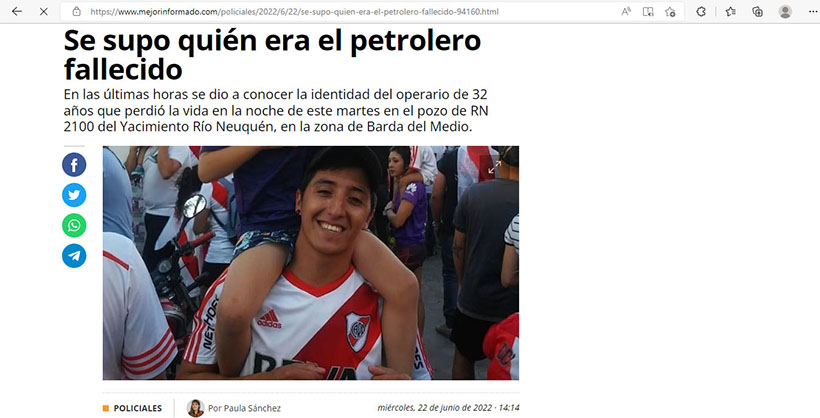
Portrait of Victor Vazquez published in local media and social networks.
Being a journalist who works and analyses from an intercultural perspective and knowing the degree of negationism that exists in Argentina – a country that still thinks of itself as white and European – seeing the brown colour of the young victim’s skin is not a minor detail, nor anecdotal. The visual signs clash and confront each other like unconnected parts. A symbolic war that always seems to find the same channel: power, money, dehumanisation. A visual battle that seems to meet at irreconcilable points, but that finally speak of the same thing: the word rakizuam, the colour blue, the dark skin of the deceased worker, the flag of England. YPF, the National University of Comahue, the unworthy and racist insults on social networks towards a group of Mapuche teachers and students who raised a flag (wenu foye) during the wiñoy xipantv.
Faced with the death of an operator of the extractive project in the region, the questions are multiple: what does the National University of Comahue prepare its students for: to profess empathetic and critical acts towards the rest of society or to become professionals who are functional to the business of death and negationism? How much does the Western perspective influence this market of death, where the knowledge and identities of pre-existing peoples are denied and where zones of sacrifice are recognised where life should live? How many vital elements can an extractive company place in danger, without a condemnation, a definitive cessation of its activities? Can the life of people, the elements of nature, the local flora and fauna – which insist on persisting in the world – be balanced with devalued, useless and archaic papers? Is that the response they are going to give to Matías’ relatives: money? Does the extractive business really justify polluting the water we drink, expelling the ancestral communities that have inhabited this territory for thousands of years, undermining their ancestral kimvn (knowledge), even neglecting the health of the workers themselves who give up their lives for an inhuman project? In exchange for what? Is it really comparable that, within the discourse of extractive progress, a company that is capable of generating 500 million pesos (in less than five years) only hires 80 workers? 500 million pesos! And it only hired 80 employees? Is this the (extractive) bonanza that local and national political leaders boast so much about? Progress for whom? Who really benefits from the literal implosion of the territory in the provinces of Neuquén and Río Negro?
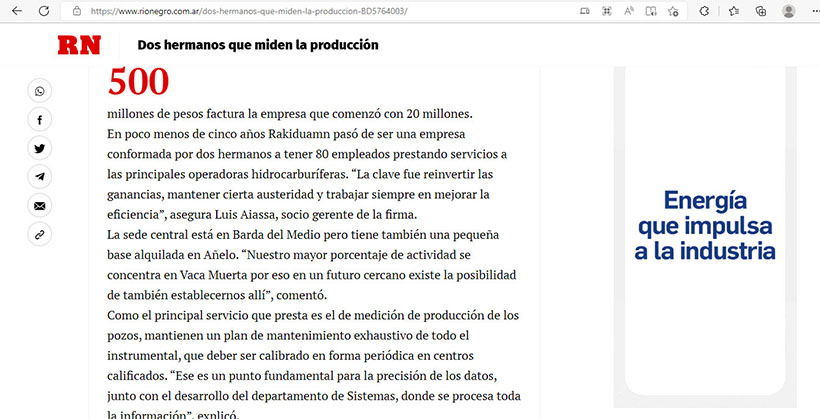
The operational size of the company Rakiduamn SRL. is 42,000 m2, including the Añelo and Barda del Medio bases. However, what is difficult to measure is the capacity of a company like Rakiduamn SRL to cover up and silence.
Just as state prosecutors are capable of hiding and/or making evidence disappear in cases of forced disappearance or trigger-happy behaviour, this company has the tools and official authorisations to erase all traces that could expose hydraulic fracturing as a possible crime against nature and the integrity of the different forms of life (not only human) that inhabit this side of the territory.
Rakiduamn SRL represents the silencer that fracking – as a lethal weapon – needs to remain and position itself even over the traces of death that this same machinery produces.


